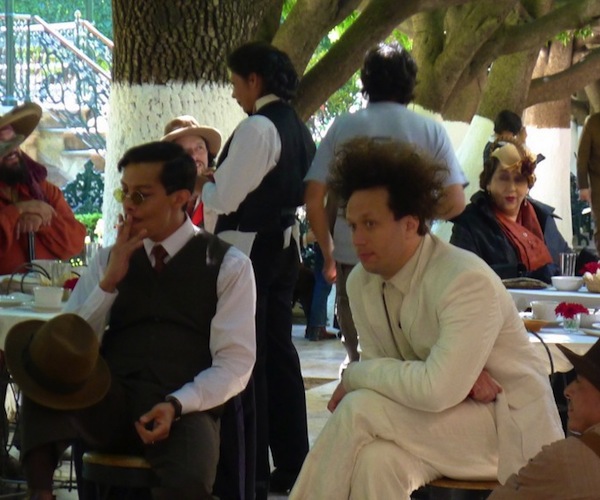Film Review: Maine International Film Festival — Off and Running with “Eisenstein”
Eisenstein in Guanajuato is another major achievement from the iconoclastic British director Peter Greenaway.

A scene from Peter Greenaway’s “Eisenstein in Guanajuato.” Photo: Karin S. DeBoer.
By Paul Dervis
The 18th Annual Maine International Film Festival (through July 19) opened two nights ago in Waterville. A quick look at its lineup suggested that this year promises to be one of the gathering’s most diverse and provocative ever. I caught up with Programming Director Ken Eisen a few hours before the opening screening and he was all smiles, telling me that this year we “may have the best films we have brought here in our history.”
And that is saying a lot.
I came up a day earlier than usual because the festival kicked off with Peter Greenaway’s new movie Eisenstein in Guanajuato. I knew it would be visually distinctive and emotionally torrid…that’s just what Greenaway does. It did not disappoint.
I checked into my host hotel, the Fireside Inn, dined on my complimentary whoopee pie, (they know how to treat you right at the Fireside), and hunkered down for a whirlwind weekend.
Even the weather is great.
English director Greenaway has always been oblivious to (or is that contemptuous of?) the rules of commercial moviemaking. Still, he has had his share of major box office successes, ranging from The Draughtsman’s Contract to The Cook, the Thief, His Wife & Her Lover (undoubtedly his most well known piece) and my personal favorite, The Belly of an Architect. Here, he tackles a moment in time of his filmmaking idol, Russian director Sergei Eisenstein.
It is 1931 and Eisenstein, after making only three films, has travelled from his native Russia to Hollywood, hailed as the greatest filmmaker the world has known. But nothing works out for him in Tinseltown and he accepts an offer from novelist Upton Sinclair to rejuvenate and continue his film work in Mexico. And this is where the movie begins. In one ironic scene we see our protagonist marvel at the creature comforts the West offers that are unknown in his native land: he rejoices in the availability of a shower in his hotel, lounges in an outdoor cafe, wears a white linen suit he bought in America.
The plot line is intentionally haphazard; we jump around in space like a helicopter whirling out of control. Greenaway throws out a myriad of disconnected images that both confuse and enthrall. If it is a straightforward narrative you are after, then Eisenstein in Guanajuato is not for you.
The movie is about Eisenstein’s sexual awakening.
The young director has been given a guide for his time in Mexico, the ridiculously handsome Canedo, a family man with a wife and two children at home. But Eisenstein is romantically drawn to him and Canedo does not disappoint. He knows his way around a sexual neophyte like Sergei. Eisenstein came to Mexico a virgin, and leaves the country in love.
But Eisenstein’s romance is not what is so striking about this film; it is the cacophony of images that Greenaway tosses with eye-poppng aplomb onto the screen. The movie is dark, than it suddenly becomes light and vibrant, moving in seconds from earth tones to vivid colors. And Greenway often splits the screen into three images, triptychs (sly homages to Eisenstein’s cinematic techniques) whose juxtapositions assault our senses. And the images are often amazingly sensual. The outdoor plazas the pair sit in, their richly warm hotel room, and their lovemaking. Some viewers will find portions of the film obscene, but I doubt if anyone can keep their eyes off the screen.
Finnish actor Elmer Back, as Eisenstein, gives an exhilaratingly outsized performance as the larger-than-life director. He can swing between out-of-control insanity and abject pathos in a heartbeat. Luis Alberti, calm and always-in-command as Canedo, provides a grounding contrast. The two actors — epitomizing Greenaway’s vision of a carnal yin and yang — complement each other perfectly.
Greenaway has created another major work here. While exploring the heart and soul of a genius, he blows you away with split screens, lighting, and naked debauchery
What an opening act for the MIFF.
Paul Dervis has been teaching drama in Canada at Algonquin College as well as the theatre conservatory Ottawa School of Speech & Drama for the past 15 years. Previously he ran theatre companies in Boston, New York, and Montreal. He has directed over 150 stage productions, receiving two dozen awards for his work. Paul has also directed six films, the most recent being 2011’s The Righteous Tithe.

An interesting quote from Peter Greenaway about this film in Sound on Sight: